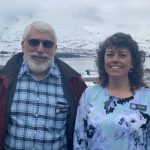
President Robert Archibald, City of Homer
Executive Director Donna Schantz
The Council views itself as a partner of and resource for industry and regulators. In our advisory role, we provide expertise and local knowledge with the goal of collectively protecting the place in which our communities and livelihoods depend. A true friend gives both support and pushback when needed in life. In the same way, the Council works hard to recognize the successes of industry and also provide constructive feedback to continuously improve prevention and response systems in our region.
We remain concerned with what the Council views as a steady deterioration of regulatory oversight due to federal and state budget and staff reductions at key agencies. We also see budgetary and other reductions within industry. Both are constantly pressured to do more with less. The Council believes that if these problems are allowed to persist, the people, environment, and economy of Alaska will be at higher risk of another major oil spill.
Over the past year, the Council has encouraged the Alaska Legislature to ensure sustainable funding for the Alaska Department of Environmental Conservation, Division of Spill Prevention and Response. Reduced revenues have resulted in a chronic shortfall. This directly threatens the department’s ability to effectively oversee the oil industry in Prince William Sound.
The Council has also been closely monitoring damage to oil storage tanks that occurred at the terminal in early 2022, and the subsequent work by Alyeska and regulators to investigate, repair the damage, and prevent a recurrence. While no substantial injuries were associated with this event, hydrocarbons were released to the atmosphere and there were operational risks associated with oxygen ingress into the tank head space. The Council believes this event was a near miss that could have had devastating consequences.
Events such as this, especially while resources are being cut back, are of primary concern to the Council and its stakeholders. We raise these issues so that appropriate and effective actions can be taken.
The prevention and response system for Prince William Sound and its downstream communities was developed through partnerships, and extensive work from members of the oil industry, federal and state regulators, legislators, and citizen stakeholders: Alaskans working together with industry to ensure an oil spill like the 1989 Exxon Valdez never happens again.
There have been vast improvements to the safe transportation of oil in the decades since the Exxon Valdez oil spill. The Council must work harder than ever to make sure the safeguards put in place to prevent another disaster are not weakened and the lessons learned are not forgotten.
The oil spill that did not happen is hard to hold up as an accomplishment, and the importance and cost associated with prevention can often be dismissed. It takes a lot of work, and the cooperative effort of many every day, to protect the place we live, work, and play.
Tough conversations must happen as we strive to maintain and improve upon the safeguards in place. Our history of success means that citizens must stay active and maintain partnerships with industry and regulators to keep this system working.